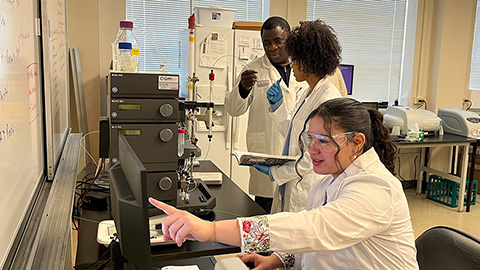Policy is your BFF
You have finally landed that first faculty appointment. You start to build a lab, take on student researchers, build your classes and find out where you fit in your institution’s cultural landscape. But suddenly, all the things you haven’t been trained for start happening. Part and parcel of your career as a faculty member who assigns grades, manages a laboratory and works with colleagues is navigating contentious situations that can consume your time and energy and cause considerable stress.

In this article we provide some advice to reduce the stress of everyone involved. This is where policy is your friend. From our experiences as faculty and administrators, we have learned, sometimes the hard way, that following a policy and corresponding structured process can minimize stress and contribute to a better outcome.
The scenario
You have just taught Introduction to Biochemistry for the first time, and you made several adjustments to grading schemes during the semester. To compensate for your inexperience, you were extra generous with your grading.
Now that the course is over, a student emails a request for a meeting during which they tell you that the failing grade you assigned them is not fair. They assert that if you had followed your syllabus grading scheme — and taught better, by the way — they would have a much better grade; you have now negatively affected their career.
You feel some anxiety. You know this wasn’t your best effort, but you really tried to foster learning and compensate with generous grading. You make a couple of attempts to re-explain how you graded their work, but this student seems unable to accept any personal responsibility for not passing.
Here are four possible responses:
(1) “Look, you are the only one who didn’t pass, and if you had spent any reasonable amount of time studying, you would have made it.”
(2) “OK, I’m going to raise your grade, but promise not to tell anyone.”
(3) “I’m sorry. We are unable to resolve your grade issue. We have an appeal process, and you should contact (the appropriate person) for further discussion. I’ll send you the appeal process by email.”
(4) “All the students in this class were graded with the same metric. Please submit a written argument for the change in grade you are requesting.”
Scenarios like this are quite common. Sometimes we just want to make the problem go away.
The response
The problem with (1) is that you are personally judging the student and escalating the problem that will ensue if they push the matter further. If you’re not careful, this could go beyond a grade discussion into charges of microaggression. We have found that it is better to listen sympathetically to a student; there are a thousand reasons they might not have performed well. It is easy to jump to conclusions that may be biased and should not be asserted, even if you have evidence for them. We are not here to judge the student but to evaluate their academic performance fairly.
At first glance, (2) seems like a simple way to make the problem go away and help the student move on. However, giving selective advantage to one student over others is problematic, because it degrades the integrity of the academic process associated with grades and is not equitable. It’s legitimate to re-evaluate how you graded and act accordingly. If this student deserves some adjustment, so does everyone else. One of the authors actually turned in a large stack of grade change forms for a whole class once after a student pointed out an error.
Another big problem with (2) is thinking the student will keep your confidence; it is inappropriate to ask that of them. Anything you say, even casually in the hallway, may be repeated. One of the authors once was hurrying down a hall to go somewhere and said, “I’ve got to get out of here.” Within days, the rumor was all over campus that they were angry and leaving the institution. This required a lot of damage control.
The best response is either (3) or (4), depending on your institution’s policies. Many universities prefer that a faculty member attempt to resolve a problem with a student before it goes to the appeal stage. Even then, a conversation with your chair is a good idea, especially the first time.
If the appeal process is needed, it should preserve your academic and personal integrity and honor the student’s desire for closure. Let the system work for both of you. Document your interactions with the student and your rationale for the grade. An appeal process will evaluate whether you followed your syllabus. You likely will do a better job next time you teach Introduction to Biochemistry, and you will see why it’s important to have a stable grading scheme.
Practical advice
Take a deep breath. Control your emotions. Remain professional no matter what horrible characteristics are attributed to you or another person. Staying calm always will promote a better outcome. Be purposeful at stress control, using techniques such as exercise or meditation.
Educate yourself. Become familiar with governing documents, such as faculty and student handbooks, and look for guidance. Ideally, you will be familiar with these policies before you need them. You may have to search a bit, since different policies apply to different situations: academic integrity, integrity in research, grievance, etc. Most internal policies are derivatives of larger mandates. Two important examples for academics are the Federal Right to Privacy Act and Title IX of the Educational Amendments of 1972. Both are complex, but more knowledge is better.
Whether you realize it or not, when someone brings a concern to you, a policy and corresponding procedure has been set in motion, even if you are not yet familiar with that policy and procedure. The concern may end with an informal conversation, but it also may progress to formal steps.
Get good advice. As a faculty member, start by asking your department chair what policy covers the issue you are facing. Different policies are housed in different university departments for different concerns. For example, grade appeals commonly are housed in academics, while harassment concerns may be housed in student affairs. You need a clear understanding of both the policy and where it is housed in the university structure.
Keep a record. Make sure you have an easily accessible written record of all interactions. Choose both spoken and written words very carefully. Follow up on in-person and phone conversations with an email summarizing the conversation so that both you and the other person in the conversation can view and respond to the summary. Even if a concern is resolved amicably early in a process, it might be revisited later.
Know your deadlines. Make sure your responses and formal actions are completed in a timely fashion and include everyone who needs to be included. Be aware that many issues should be shared only with individuals who have a need to know. Avoid sharing with large groups, such as your department faculty, unless there is a clear reason to include them.
Be thoughtful. Many decisions involve making a judgement call about a complex issue without a clear right or wrong. Most policies have appeals and administrative reviews built in. It is OK to be overruled if you have a rational explanation of your decision. Throughout the process, ask yourself what a reasonable person would do in this situation. Acting reasonably should minimize any long-term consequences.
Let it go. Learn from your experience, reflect on best practices moving forward and let it go. Every concern is unique. Emotions from one concern can create bias in future concerns, and you want to avoid this. Even with the best intentions, everyone is likely to be involved in a formal process at some point. This does not mean you are a bad person. The process allows all perspectives to be heard. With reflection, the process can lead to positive changes in everyone involved. The next time you are involved in a formal process will be easier, and the value of the process will become apparent.
Make it better. Sometimes, after being involved in a process, you will want to suggest changes to improve the policy. All the previous advice also applies if you decide to go on a quest to change institutional policy. Institutions have a lot of inertia, and working through a legislative process can be frustrating and time consuming, so be prepared. You may want to run your ideas by some of your senior colleagues and let someone else be the standard bearer while you put more time into your research and moving toward rank and tenure.
Enjoy reading ASBMB Today?
Become a member to receive the print edition monthly and the digital edition weekly.
Learn moreFeatured jobs
from the ASBMB career center
Get the latest from ASBMB Today
Enter your email address, and we’ll send you a weekly email with recent articles, interviews and more.
Latest in Careers
Careers highlights or most popular articles


Let’s make ASBMB awardees look more like BMB scientists
Think about nominating someone outside your immediate network.

Calendar of events, awards and opportunities
It's time to vote in the society's election, and time's running out to nominate colleagues for the ASBMB annual awards.

Calendar of events, awards and opportunities
Apply for our Advocacy Training Program by April 19. Plus, submit your entry for molecule of the year!

So, you went to a conference. Now what?
Once you return to normal lab life, how can you make use of everything you learned?

Touching the future from the bench
Scholar, scientist, teacher and mentor Odutayo Odunuga discusses the important roles of the institutional PI, his journey and his research.


